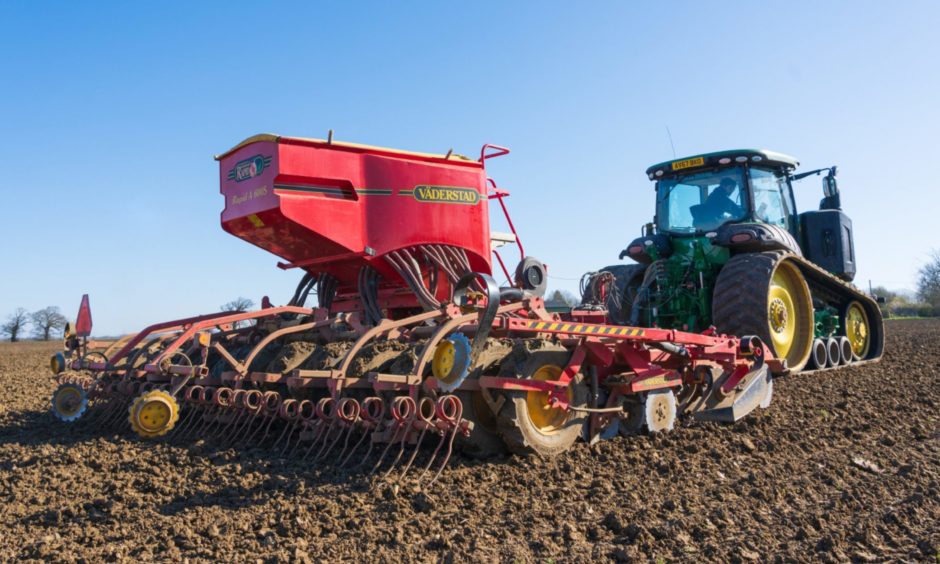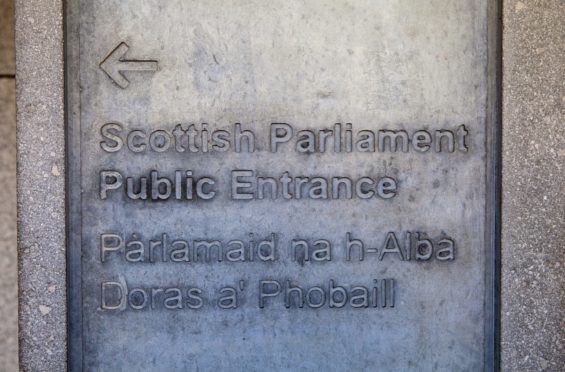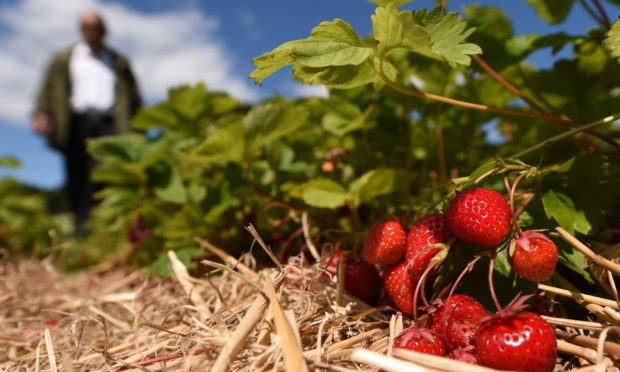Workers coming to the UK to pick fruit and operate in agriculture are at serious risk of forced labour and human trafficking, groups warn.
A report conducted by Focus on Labour Exploitation (Flex) and the Fife Migrants Forum warns the scheme that allows people from overseas to work in agricultural roles including soft fruit picking is at risk of exploitation.
They found workers were at direct risk of human trafficking as a result of the Seasonal Agricultural Workers Scheme (SWS) pilot, which was introduced following the end of freedom of movement after the UK left the EU.
The worker entry programme has been criticised from the outset, with farmers concerned not enough people were being granted permission to work in the high season, which would have detrimental effects on soft fruit production.
It is understood this is the first survey of its kind to focus on the experience of workers on the seasonal scheme.
‘Feel like slaves’
Workers have claimed they are made to feel like “slaves”, the report uncovered.
Accommodation provided to overseas workers is often mouldy, with damp prominent, as well as being dirty and unhygienic.
Workers reported having no washing facilities other than a paid service where a woman took their clothes and returned them wet.
They were prohibited from drying clothes in the caravan so their farmer offered them a polytunnel in which to dry clothes. This was leading to continuously damp clothes, they claimed.
People who complained about working and living conditions were threatened with termination of employment and a majority of workers felt they were pressured into doing more work than they had time for.
How forced labour is identified
The report identified several indicators for each of the three dimensions of forced labour as being met, presenting a serious risk that forced labour could take place on the SWP if action is not taken, the authors of the report concluded, including:
- Risk of unfree recruitment based on a discrepancy between information workers received about the nature of the work and the reality upon arrival, the lack of translation of documentation, and pressure to sign contracts. In addition, 62% of workers reported incurring debts to travel to the UK to work, which places workers in a more vulnerable position and at risk of accepting work they might otherwise not have accepted.
- Risk of work and life under duress, with workers reporting threats of penalties, unsafe housing in caravan accommodation, and excessive dependence on employers due to the use of zero hour contracts coupled with payment by piece rates. Some 66% of SWV workers reported receiving threats of loss of work and 17% reported threats of deportation from their employer.
- Risk of impossibility of leaving an employer, with 62% of those interviewed reporting being refused transfers to alternative employment. Coupled with the high debts workers reported having to repay, as well as risks of homelessness or deportation, this resulted in workers having reduced freedom to terminate their employment contract.
Billy Lynch, interim manager at Fife Migrants Forum, said: “Throughout the term of the research I became increasingly concerned about the infringements experienced by workers and the desperate situations they found themselves in.
“My concern has turned to both shame and anger. People from other countries, due to their experience of this pilot, view Scotland in a very poor light, where some can even feel like slaves. I’m angry that in 2021 we can still ride roughshod over basic human rights.”

Flex chief executive Lucila Granada said: “The report reveals that the Seasonal Workers scheme is increasing the risk of human trafficking for forced labour in the UK agricultural sector.
“The evidence calls for an urgent review of the scheme, and for the UK Government to carefully consider and mitigate potential risks for workers on the Seasonal Worker Visa and in any other future temporary routes for labour migration.
“The report outlines a number of measures that the UK and Scottish governments can take to make it safer for both workers and employers to engage in the scheme.”
‘Flaws’ in scheme
Iain Brown, chairman of NFU Scotland Horticulture Working Group, said: “Migrant workers are a vital asset to Scotland’s fruit, vegetable, and ornamental plant producers, and they are a critical part of the sector’s success.
“It is therefore essential that Scotland remains a desirable place to work, and with an employee return rate of around 70%, we know that most farm businesses are considered attractive and rewarding places to work.
“For some workers, however, their experiences while working in the UK are not acceptable. NFU Scotland will be working with its members and the wider industry to address this in order to improve the experience for both growers and migrant workers.

“In Scotland agricultural wages are higher than those in England, and higher than the minimum wage.
“We believe that higher wages, coupled with robust auditing by Sedex and the GLAA make good working conditions the norm in Scotland, and we will work hard with the sector to extend this to all farms.
“The Flex report has highlighted many flaws in the UK-wide scheme, particularly the debt burden placed on migrant workers, and poor or false information that has sadly resulted in some unsuitable and uninformed candidates coming to Scotland to work.
NFU Scotland wants lessons to be learned and action to be taken following this report.”
Ian Brown of NFU Scotland
“This difficult situation has resulted in people feeling trapped in some cases. The Covid pandemic had a devastating impact last year, and the necessary lockdown requirements of quarantine and isolation will have doubtless made it more difficult for migrant workers.
“NFU Scotland wants lessons to be learned and action to be taken following this report. We want to see a permanent scheme that gives farm businesses the ability to recruit directly, which worked so well in the past.
“If farm businesses can go back to directly engaging with the recruitment process then this will benefit workers and businesses alike.
“The report also shows that some workers reported receiving zero hours contracts, despite the fact that in May 2019, the former Immigration Minister Caroline Nokes stated to the House of Commons that the “scheme operators are not permitted to offer zero hours contracts to workers”.
“A better option for growers is to offer a contract with an element of guaranteed hours, which would give the workers the assurance that they will earn enough to repay their debts and return to their home countries without fear.”
Translation helpline
Scottish Government Rural Affairs Minister Ben Macpherson said: “The findings of this report are concerning and highlight the need for an urgent, comprehensive and effective response.
“The research also shows that many people who come to Scotland as seasonal workers have a positive experience. We know that some workers return year after year, and we want to build on best practice to ensure everyone coming to Scotland has a positive experience.
“In order to help seasonal agricultural workers with any issues they may have during their time in Scotland, we have provided RSABI with funding to allow them to run a pilot to extend the scope of their current helpline.
“This will include a translator service which will be available out of hours when workers are most likely to call for help. The first stage of translator service delivery for the pilot would start on March 22.

“The independent research demonstrates that Scotland currently has a high dependency on migrant workers to fill roles in agriculture, particularly in the horticultural sector.
“With the powers that we have, the Scottish Government is committed to doing all it can to address the relevant recommendations from the research to ensure that Scotland continues to be a desirable destination for those workers who play a vital role in the continued success and growth of horticulture, and other rural industries.
“The Scottish Government will, of course, seek to work together with the UK Government on areas where devolved and reserved issues intersect.
“However, many of the issues in the report relate to failures in the design and delivery of the UK Government’s temporary immigration scheme – and we urge the UK Government to fully engage with the findings.
Immigration: Victory for fishermen over ‘ridiculous’ deckhands rule
“The report indicates that the Seasonal Workers Pilot is not functioning as it should for employers or seasonal workers and – in addition to the considerable cost and bureaucracy involved in participating in the scheme – the UK Government must make necessary improvements in order for the scheme to meet the needs of the sector.
“I, along with the migration minister, Jenny Gilruth, have written to the UK Government’s Immigration Minister, Kevin Foster, calling on the UK Government to implement the recommendations urgently, and engage regularly and meaningfully with the Scottish Government, Focus on Labour Exploitation and the Scottish agriculture sector going forward.”
All of our scheme operators provide a helpline, enabling workers to report any concerns and seek assistance whenever they need.”
UK Government spokesperson
A UK Government spokesperson said: “The government takes the safety and wellbeing of seasonal workers extremely seriously, with all farms vetted by the licensed Scheme Operators.
“Workers should only be placed with farms which adhere to all relevant legislation, pay the National Minimum Wage and provide suitable living conditions.
“All of our scheme operators provide a helpline, enabling workers to report any concerns and seek assistance whenever they need.
“The operators are licenced by Gangmasters and Labour Abuse authority, any issues of mistreatment can be reported to them and will be taken seriously.”
